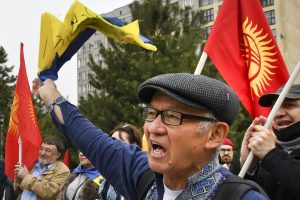Despite protections in the Constitution and Civil Code, Kyrgyzstani authorities are punishing peaceful protesters and restricting public assembly.
Since Russia’s invasion of Ukraine on February 24, Bishkek residents have regularly gathered in front of the Russian Embassy – both to protest the war and to express support for Russia.
Tension around the war and support for Russia is rising, as tens of thousands of Russian citizens – which includes many born and raised in Russia, but also a large number of people born in Kyrgyzstan who sought a Russian passport to work legally abroad – come to Kyrgyzstan. Kyrgyzstan’s leaders are in a tight spot diplomatically, given the country’s reliance on Russia in economic and security spheres. They have not issued statements as explicitly critical as Kazakhstan or Uzbekistan, but instead have tried to maintain an air of neutrality.
Part of maintaining that neutrality involves tamping down protests that could be framed as anti-Russian. At first, this involved targeted arrests and fines for anti-war protests. On March 5, both a pro-Russia and anti-war demonstration took place in front of the Russian Embassy. According to Gulshaiyr Abdirasulova, the head of human rights organization Kylym Shamy, the police only detained people participating in the anti-war demonstration, including children and activist Mirlan Asakeev.
Two more activists – Dinara Erkimbaeva and Lesya Khmet – were arrested on March 11 for an anti-war protest in front of the Russian Embassy.
Their protest violated a protest ban that Bishkek’s police department instituted – without any public announcement – on March 11. The ban only extended to certain locations in the city, including the central Ala-Too Square, the White House building, and the House of Government in addition to the Russian Embassy. Gorky Park – a small spot, hidden by trees, in the northeast corner of downtown Bishkek – was specified as the sole designated space for public gatherings.
Bishkek’s Pervomaiskii District Court recognized the legality of the protest ban on March 14. On March 17, human rights defenders Ondurush Toktonasyrov, Dinara Oshurakhunova, and Aziza Abdirasulova organized a protest both in support of Ukraine and against the restrictions on assembly in front of the Russian Embassy. They were quickly detained and charged with “light hooliganism,” but were eventually fined 3,000 Kyrgyz som (about $36) for “disobedience to the lawful demand of a law enforcement officer.”
This is not the first time that Bishkek authorities – specifically, the Pervomaiskii judge and police district – have restricted protests.
In 2020, authorities banned protests in Bishkek’s city center from March 1 until July 1. While they cited concern with the spread of coronavirus, the timing serendipitously (or strategically, depending on who you ask) coincided with the International Women’s Day march that local feminist groups organize each year. Bishkek Feminists Collective held the march anyways, but were attacked by a group of masked men and packed into buses by police.
A year later, the Pervomaiskii District Court banned peaceful marches and protests in Bishkek from February 22 until April 22. The decision came shortly after President Sadyr Japarov criticized weekly marches against corruption organized by the youth-driven civic movement Bashtan Bashta.
Spring is often associated with an uptick in protest activity (both the 2005 and 2010 revolutions unfolded between February and April), which could explain the annual restrictions on protests in Bishkek. Authorities’ invocation of their duty to protect social order and the rule of law is a common tactic to justify repression in autocratic countries.
Regardless of any attempt to rationalize these restrictions, imposing any limitations on citizens’ freedom of assembly goes against the letter of the law in Kyrgyzstan.
Some high-level authorities have challenged such repression. Atyr Abdrakhmatova, Kyrgyzstan’s ombudsman, is tasked with protecting citizens’ rights and freedoms as laid out in the constitution. Speaking on March 17 – the 20th anniversary of a massacre of protesters in Aksy – Abdrakhmatova harshly criticized the Pervomaiskii Court’s affirmation of the police department’s protest ban. Beyond the fact that such a ban goes against Kyrgyzstan’s international legal obligations, she argued that it undermines the country’s own historical and political development.
“I urge everyone not only to remember the events, but to try to learn a lesson from the tragic consequences of restrictions on the rights and freedoms of citizens,” she wrote in a statement. “After all, the Aksy events went down in the history of sovereign Kyrgyzstan as a day for the defense of democracy and the strengthening of statehood.”
It is noble for Abdrakhmatova to speak out against authorities’ repressive measures. Given the spate of politically-motivated arrests since Japarov assumed power – and targeted censorship since Russia’s invasion of Ukraine – her disavowal could prove risky. But as formal channels for civic engagement are chipped away, principled public servants are key actors in fighting repression.

































